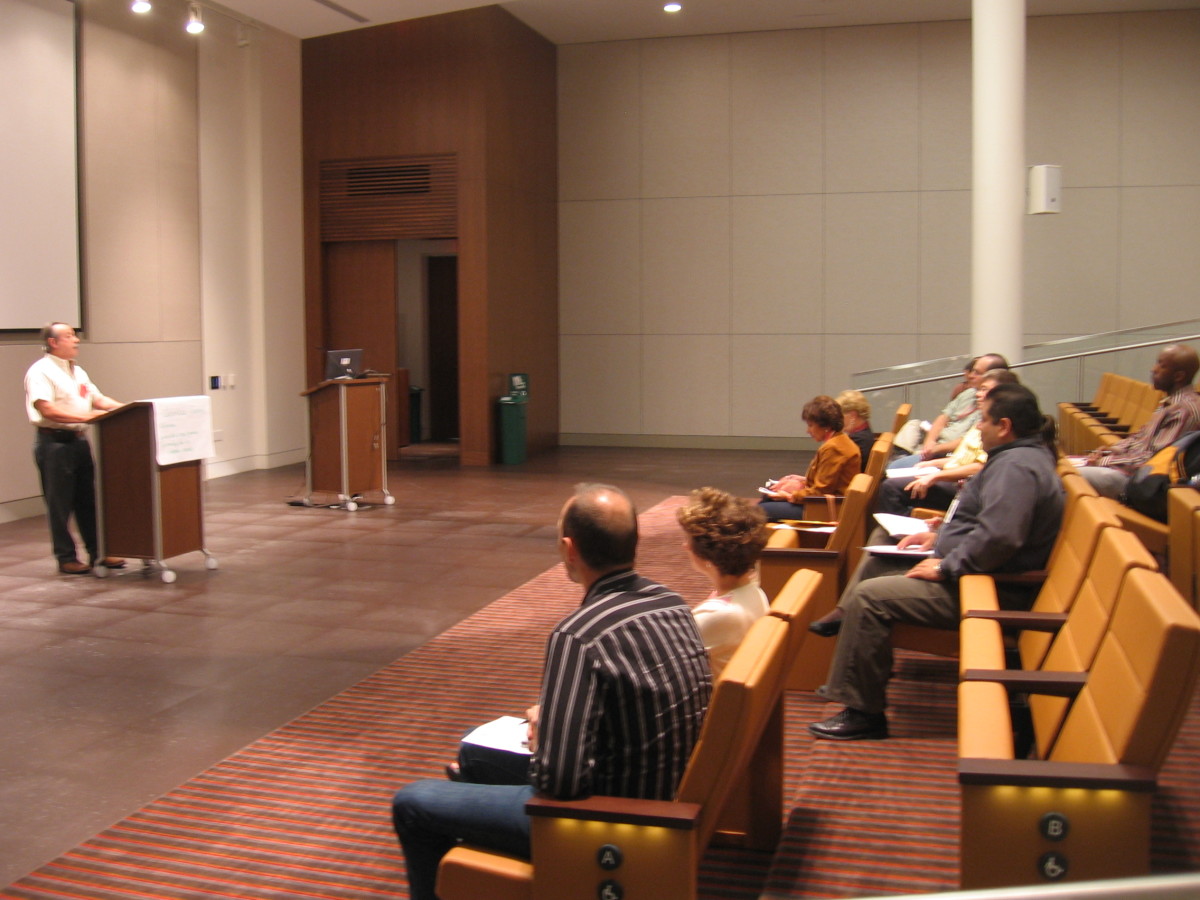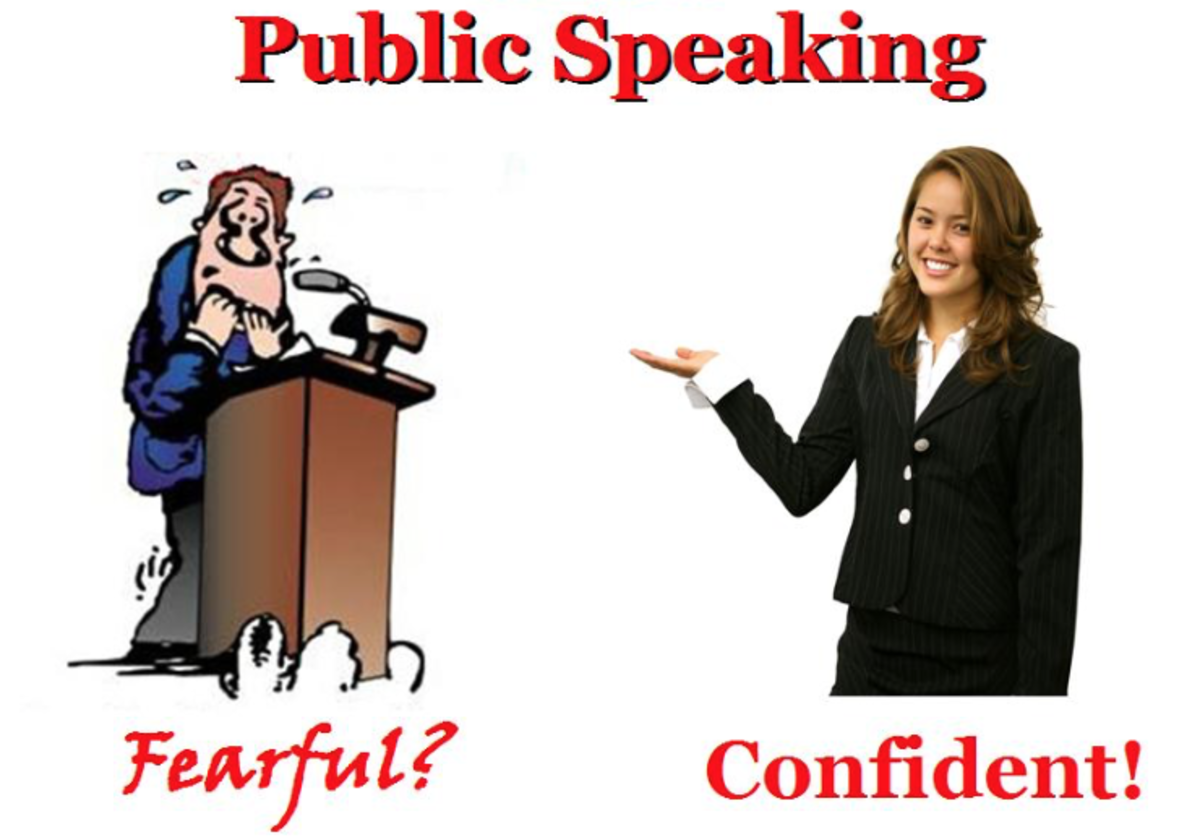How to Have Confidence When You Speak Up Front
How do you feel before speaking?

Speeches change the world. Wars have started, religions have made converts, and great ideas have become realities - all through speeches. Your ability to motivate, inspire, and develop the world around you is based largely on your ability to speak effectively.
Public speaking is considered the world's number one fear. In fact, the average person is more afraid of speaking in public than dieing! Perhaps you are one of these individuals. Maybe the idea of having thousands, or hundreds, or even just half a dozen people peering towards you as you attempt to toss words out of your mouth scares you more than anything.
The following tips are intended to provide you with an effective way to communicate confidently and effectively. So, whether you have stage fright or simply want to improve your speaking skills, consider taking a look at the following tips and you too can become a professional speaker - or at least not wet your pants the next time you go up front.
Pre-Speech Confidence
The art of speaking with confidence starts far before you are actually asked to speak. It is necessary to develop a foundation of knowledge and experience before going up front to actually speak. To give yourself a better chance of having confidence when you speak, do this pre-game work:
- Know your material: One of the worst things for one's confidence is to give a speech without having any idea what one is talking about. Too often people think that they can just go up and give a speech without having any idea of what one is talking about. Once you are a good speaker, this is certainly possible. However, regardless of how much you know about the topic, it is necessary to have a game plan for your talk before you get up to give it.
- Add some humor: As you are planning out your speech, add an interesting anecdote or funny situation to lighten the mood a little. Make sure that you have the story right before you try to tell it, or else it will end up not getting a laugh. But some lightheartedness will add a lot to one's talk.
- Practice in front of the mirror: It doesn't matter what your spouse, roommate or neighbor may think, practice in front of the mirror. People can call you vain, ridiculous, or anything else, but you will be much happier with yourself when you know that your talk is a success because you put the necessary time into it.
- Start pumping yourself up: Being confident is a good thing! Being arrogant is not. You should start telling yourself that you can do it, you will do it, and you will be great at it. The more you picture yourself being a success, the more likely it is to happen.
Pre-Stage Confidence
As the time of your talk approaches, prepare yourself for success and add a bit more confidence to your attitude by following these principles:
- Dress for confidence: It is said that students do better on tests when they are suited up. The same goes for speeches. If you dress confident it will not only make others see you as confident, but it will also make you feel more confident about yourself.
- Smile: The smile is an incredibly valuable asset at any point in your life, but especially when interacting with people.
- Meet the audience: Going out of your way to meet some of the people you will be speaking to is a surefire way to increase the success of your speech. As people get to know you, they will be more involved in you while giving your speech - you go from being a stranger to an acquaintance. Also, as you meet the audience, you begin to know that you are talking to nice people who will not treat you poorly if you stumble a little.
- Take a moment alone to turn the jitters into adrenaline: Just as athletes can take a minute before a game and make their nervousness extra energy to help them win, a speaker can take the jitters and turn them into enthusiasm to make their speech that much better. Take a moment to run to a restroom, take a few deep breathes, and give yourself a positive affirmation in front of the mirror.
Speaking Confidence
The time as come and you've been asked to the front of the room. All eyes are now on you. They are here to listen to what you have to say, but you still feel nervous. Here's what you can do:
- Smile: As you get up to the front, make sure you are smiling.
- Take a deep breath: Spend a moment to breathe in slowly and compose yourself.
- Make eye contact: By staring at individual people, you can start to feel that it is more of a conversation then something that you are having to do alone.
- Walk around to hide nervousness: When you are moving, people can't see you shaking.
- Know that you are confident: Fake it 'till you make it! Even when confidence doesn't come right away, you can tell yourself that you are confident and feel better about yourself.
Learning from a Speaking Experience
Not all speeches, whether you are an amateur or a professional, will go as good as you would like them to. Sometimes you might get a hard audience, other times you might be in the wrong mood, and at another time you might be following someone who seems to be the world's best speaker. By looking back on your talk with an accepting and critical eye, you will be able to learn how you can improve your next speech to make it even better.
Never give up because something goes terribly wrong. Remember, an awkward situation usually makes for a great story in the future. Write about it here on HubPages and I'm sure you could get a lot of laughs and make some money!
Now go out there and start speaking to make the world a better place!








